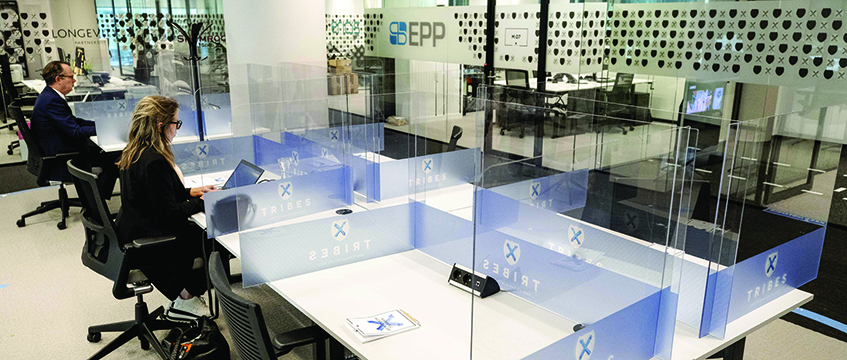The Covid-19 pandemic has undoubtedly, and perhaps permanently, changed the way that businesses work. This is no more obvious than in the world of employment law, where even the most basic employment question has become a conundrum. Can I make my employees attend the office? Do I have to pay staff if they are stuck at home? Can I send employees to conferences abroad?
Can employees return to the office?
The government, having very recently been promoting a return to the office, has now announced once more that people should be working from home wherever possible.
An employer’s primary duty is to protect the health and safety of their employees. They should therefore not be reopening the workplace unless it is absolutely necessary to do so.
For workplaces that have had to stay open, employers can make the workplace “Covid safe” by following various measures. The government’s guidelines contained in Working safely during coronavirus (Covid-19) will assist in this.
To start with, employers must carry out a Covid-19 risk assessment which identifies the areas where there is any risk to health. In particular, consider those areas such as kitchens and bathrooms where employees are likely to be crossing paths. Don’t forget to address the risks of transport to and from the office.
A risk assessment will help employers to mitigate the risks with comprehensive measures. Best practice remains that staff should be at least 2m apart when working. Measures that employers will need to consider putting in place include one-way systems, sanitising stations, more frequent cleaning, the installation of screens and/or line marking on floors. The risk assessment should also acknowledge that the risks may be greater depending on the vulnerability of the individual.
Employers may wish to consider creating “bubbles” within their workforce, with each employee interacting with the same staff members on a day-to-day basis. This can minimise the risk of widespread transmission. Similarly, staggered arrival and exit times can reduce the stress on communal areas and mitigate against rush-hour concerns.
A comprehensive risk assessment resulting in Covid-secure measures is also a means of reassuring employees who are fearful of returning to work.
Remember, an employer’s health and safety obligations don’t disappear at the office doors. Employers still owe obligations to their employees to keep them safe while working from home. To that end, employers may wish to conduct health and safety assessments for staff at home to ensure they have all they need to work safely.
Statutory sick pay (SSP), holidays and self-isolation
For those with staff in the workplace, employers are likely to have to manage an ongoing flux of employees who are required to self-isolate. This may be due to any number of reasons. A staff member may develop coronavirus symptoms, be notified via NHS Test and Trace that they have been in contact with the virus, or perhaps return from holidaying in a country not on the exempt list.
The most important thing to remember is that disciplinary measures, such as dismissal, should not be used in response to self-isolation. It is an offence for an employer to knowingly permit a worker to attend any place other than where the individual is self-isolating. Therefore, if an employer knows that a member of staff has tested positive, or lives with someone that has, they are now responsible for stopping them from working. Failure to do so will result in fines starting at £1,000.
Employees and workers who are self-isolating due to contracting or coming into contact with the virus, or shielding, will be entitled to SSP (or contractual sick pay where applicable) from the first day. If an employee is well enough to work from home, they may not require sick leave. Employees on a lower income who are required to self-isolate and unable to work from home may be entitled to a one-off £500 support payment.
Unless an employee is unwell, they will not be entitled to SSP if they are self-isolating after returning from abroad. With this in mind, while employers cannot control what an employee does with their annual leave, clarity and communication is crucial. Employers might require employees to take paid or unpaid leave if they are self-isolating after a holiday. Alternatively, employers may be able to delegate remote work to them. Whatever the approach regarding holidays, be consistent. Make sure that the rules are made available to staff in advance to avoid awkward conversations after a flight home.
Can an employee refuse to attend the office?
An employee cannot suffer a detriment for not returning to their place of work if they reasonably believe they would be in serious and imminent danger. Of course, what is reasonable for one employee is not reasonable for another. A blanket approach is not suitable.
Employers must listen to employees. Are they or their household vulnerable? Do they have children in the house and no childcare? Is there something that employers can do to allay their particular concerns? Can staff work remotely?
This is not to say that staff can simply refuse to attend the workplace because they don’t want to. However, if disciplinary measures do become necessary, it is important that employers are able to demonstrate that the employee in question is unreasonably refusing to attend. With government guidance currently advising home working, this will be a heavy burden on the employer, who will need to show a clear line of communication and a level of understanding.
Client meetings and conferences
The real estate industry is largely built around meeting clients and attending industry events. Though many such events have been cancelled or postponed, several international property market conferences are still going ahead at the time of writing.
Use common sense when it comes to client meetings. Video calls provide a much safer alternative to in-person meetings. If employees insist on meeting clients, employers should offer guidance on how to do so in a Covid-secure manner. Employees should not be required to meet clients or be reprimanded for refusing.
The same rules will apply to events abroad, with even greater caution. Flights and conferences involve groups of far greater numbers than the workplace and an employer cannot control the safety measures that are put in place. At present, the FCO is still advising against all non-essential international travel to all destinations not on the list of exempt countries.
In such circumstances, an employee who is refusing to travel abroad is probably acting reasonably and should not be placed at a disadvantage, or disciplined, for doing so.
Furlough and the Job Support Scheme
The furlough scheme has provided a lifeline to many employers who have struggled to make ends meet during the strict lockdown period. However, it will end on 31 October 2020 and no new employees may now be added (subject to certain types of leave).
In October, the government contribution drops to 60% of the wages of furloughed employees (with a cap of £1,875 per month). Employers have to top this up to ensure that employees receive at least 80% of their wages (up to a cap of £2,500 per month) and pay national insurance and pension contributions. For each furloughed employee (earning at least £520 per month) remaining continuously employed through to 31 January 2021, an employer will be entitled to a one-off payment of £1,000.
Flexible furlough is now permitted, provided that employers agree this with staff and keep a written record of the agreement and number of hours worked. Employers must give notice to employees in order to bring their furlough to an end.
The government has announced that from 1 November, a six-month scheme – the Job Support Scheme – will top up the pay of employees who are not yet working their usual hours.
Provided an employee was on the payroll before 23 September (whether or not they were furloughed) and works at least one-third of their normal hours, the government has committed to pay one-third of the hours not worked (capped at £697.72), with the employer having to contribute another third. This will ensure that employees earn at least 77% of their normal wages even where working limited hours.
Working patterns for employees can vary, provided each arrangement lasts seven days or more, but employees working their redundancy notice do not seem to be eligible for the scheme. All businesses are eligible, but large firms must show that their business has been adversely affected by the pandemic.
More details of the scheme are likely to be released throughout October. Discover the detail here.
Grace Waterhouse is an associate in the employment law team at Collyer Bristow











